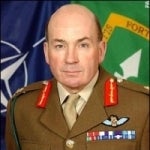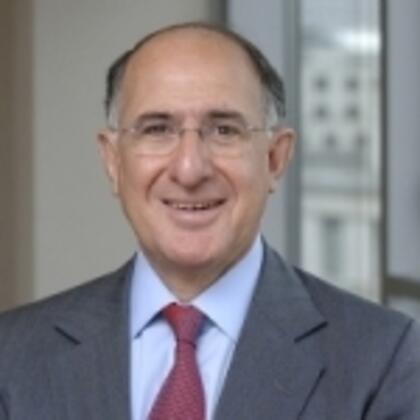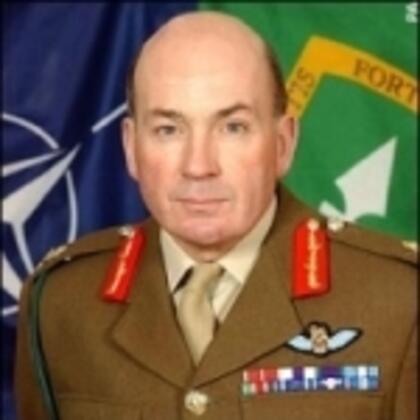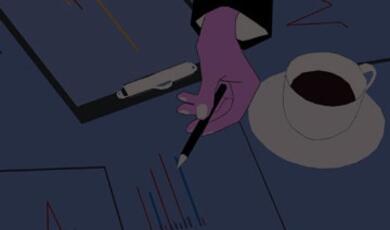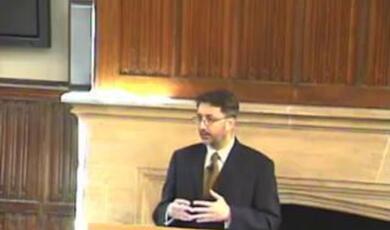Leadership at a Time of Transition and Turbulence: A conversation with General Sir Richard Dannatt
Share
- Details
- Transcript
- Audio
- Downloads
- Extra Reading
Professor Costa conducts a conversation/discussion with General Sir Richard Dannatt, Former Chief of the General Staff, to examine the challenges of leadership at a time of financial and geo-political dislocation.
General Sir Richard Dannatt KCB CBE MC ADC professional roles include: Former Chief of the General Staff; Constable of the Tower of London and Chairman of the Royal United Services Institute for Defence and Security Studies
Download Transcript
Gresham Lecture, Tuesday 1 February 2011
Leadership at a time of Transition and Turbulence: A conversation with Lord Dannatt
Professor Kenneth Costa
Lord Richard Dannatt
It is my great pleasure this evening to welcome Lord Dannatt to join me for this part of our series on “Leadership at a Time of Transition and Turbulence.”
I really cannot think of many people better qualified to speak on this topic than Richard, who is one of the most respected British generals of modern times. He retired in August 2009 after forty years service to the British army and after three years as Chief of the General Staff, which gave him overall command of the British army during a period which saw some of the fiercest fighting to date in Iraq and Afghanistan.
Lord Dannatt’s distinguished career in the army began with the Green Howards in Northern Ireland, where at the age of twenty-two he was awarded the Military Cross for anti-terrorist operations. His military service took him to Cyprus, Germany, Bosnia and Kosovo. From 2001-2, he was appointed Assistant Chief of the General staff in the Ministry of Defence, before taking command of the NATO Allied Rapid Reaction Corps. In March 2005, he took over as Commander-in-Chief, Land Command and in August 2006, was appointed Chief of the General Staff.
In the foreword to Richard’s autobiography, ‘Leading from the Front’, Richard Holmes, the well known military historian comments,
“Dannatt has been decorated for his physical courage, though he skates lightly over it here. But moral courage is often much harder to exercise, for it takes real determination to break ranks, to challenge accepted views, to be an unsettling guest in a world of compromise and, by implication, to criticize old and valued comrades. During his times as professional head of the Army, Richard Dannatt showed courage in confronting the challenges it faced and if he sticks his neck out in the pages that follow it is surely no more than to abide by the principle that characterized his career-leading from the front.”
As Chief of the General Staff, Lord Dannatt was bold and uncompromising in the decisions he made, not afraid of challenging government when necessary.
Referred to in a front page Daily Mail article as the “Very Honest General”, for his candid and forthright views, he used his position of leadership to champion the lot of British serving soldiers, arguing for improved pay and conditions for British troops.
He took risks with the media, ultimately believing that the more they were brought in, the more they would understand and therefore help to foster a greater sense of affinity between the troops and those at home.
One of the great results of the strengthening of the ties between the public and the armed forces was the launch, during Dannatt’s tenure, of the very successful “Help for Heroes” campaign, which has raised nearly 85 million pounds to support and rehabilitate our wounded servicemen and women returning from Afghanistan and Iraq.
Richard is married with four children and it is his family who he says has sustained him throughout his career in the army. One of his sons completed tours of Iraq and Afghanistan while he was Chief of the General Staff, giving him additional insight into the welfare of troops on the ground and real empathy with families of serving soldiers.
Lord Dannatt’s three years as Chief of the General Staff have shaped the debate about the role of the army in modern warfare. As well as championing the welfare of the serving soldiers, he has also campaigned for a defence strategy to more adequately meet the threats we face in the 21st century.
Knowing Lord Dannatt, I can say that there are few better qualified to talk about leadership in turbulent times. Only time will tell how history interprets the conflicts in Iraq and Afghanistan, but it will surely be remembered as one of the most testing times in recent memory for the leadership of this country.
As he concludes the last paragraph of his book, he writes,
“For two years at Sandhurst, I, along with countless others before and since, wore the motto of the Royal Military Academy- “Serve to Lead”- as part of my cap badge. Perhaps we have never needed more than we do today a full understanding of the twin concepts of service and leadership: serving others in order to learn the enormous privilege of leadership.”
I couldn’t agree more and it is this view of leadership as service which has its roots in Richard’s deeply held Christian faith which is so striking and from which we all have much to learn as we seek to navigate through these troubled and uncertain times.
Before calling on him to speak, allow me briefly to recap the series so far. In the wake of the financial crisis we live in turbulent times. We do not want to repeat the experience of this crisis, so we must make a transition to a new way of doing things. At the heart of the new way of doing things is the reintegration of the moral, spiritual and financial dimensions of our lives – in short, realising what it is to be human. Making that transition requires leadership.
In my first lecture in this series, I argued that we should see the leader as steward echoing, the Serve to Lead motto. This definition is particularly suited to the twenty-first century. All leaders – I’m sure we will discuss this – have the ability to take their followers to places they did not expect to go and might not even want to go. Leaders have a vision which they can articulate. They get us to buy into that vision.
But they can do this because the followers give them legitimacy. And that in turn derives from the followers’ conviction that the leader represents their best interests. In the modern world, that means conserving and sharing resources for the future. Simply barking out orders does not work in a Wikiworld of instant, free and empowering information available to almost anyone.
The idea of the Big Society embodies the same logic. In my second lecture, I advanced the case for the Big Society – a flourishing and proliferation of intermediate groups between the state and the individual – because it captures the spirit of what groups and communities can do in a post-crisis, Wikiworld. If the state is to retreat and allow citizens to provide more services for themselves, the most effective kind of leadership will be the steward.
When he took over as Chief of the General Staff, he saw that the military covenant between soldier and society had been greatly weakened. He set about encouraging greater dialogue and sense of understanding between the nation and its armed forces.
This is the point of connection between this lecture and those that have gone before. In them, I have argued that the covenant between the general public and the financial institutions has been severely impaired. Trust has been whittled away. Re-establishing this trust between our society, our soldiers and our financial institutions is an imperative task for our time.
And so Ladies and Gentleman, can you please join me in welcoming Lord Dannatt…..
It is a great pleasure to be here this evening. At the outset, can I say that I am delighted to be invited to give this Gresham lecture, one of a series, and I count it as a great privilege to do so. It is indeed an honour for someone like me, whose home is in Norfolk, to be associated with Sir Thomas Gresham, a Norfolk man himself, famous for establishing not only the Royal Exchange but obviously Gresham College itself, perhaps inspired, in part at least, by his uncle, Sir John Gresham, who, in 1555, founded Gresham School in Norfolk, which has thrived for four and a half centuries, and continues to do so, despite the presence, a few years ago, of my two younger children as pupils!
However, institutions such as Gresham College, the Royal Exchange, and Gresham School do not just happen. They are the result of forward-thinking and determined people and leaders who saw a need in their times, whether it was to improve education or to stabilise the currency, and did something to meet those needs. Sir Thomas and Sir John Gresham were both, I would suggest, such leaders.
Perhaps because of what I used to do as a soldier, a reflection of how things are is that I often find myself, these days, talking about leadership. Hence, consistent with the theme of this series of lectures, I picked the title “Leadership in Turbulent Times” for our discussion today. It seems to me that these are very much the times in which we are caught up at present - be it financial turbulence, political turbulence, Afghan turbulence, Egyptian turbulence, or whether we are caught up in the slipstream of some catastrophic event. However, we should not shy away from aspiring to lead in turbulent times. If leadership is to be of any real value, if leaders are to really earn their pay, then it is in turbulent times that the real qualities will out, where the real value will be added, and where true leadership will be displayed, and not when everything is going swimmingly and according to plan. I would suggest that leadership is for turbulent times, and thus turbulent times are the context in which effective leaders should thrive. After all, where in the history books would Winston Churchill have sat without the menace of National Socialism, or where might Margaret Thatcher have sat without the challenge from Argentina, or, indeed, the challenge from the National Union of Mineworkers?
Nine months into his Premiership, how will David Cameron now be considering his leadership challenge? Indeed, the same question could be asked of Nick Clegg, safely tucked in David Cameron’s side-pocket, as they approach the most far-reaching spending cuts in our history. Certainly, I wish, as our Prime Minister, David Cameron all the very best as he attempts to lead this country forward in these challenged, challenging, and nearly bankrupt times. Of course, his task is essentially just that: it is to deliver the responsibilities of leadership, which is a very different task to that of presenting oneself as someone who can do well in an election and can promise much - think of Barack Obama. This difference is something that Obama has just begun to realise over the last nine months.
Therefore, I would like to offer some views, purely from a personal perspective, on the leadership challenge generally. I do so as a lead-in to this critical subject and a foundation for our subsequent discussion. When we come to questions and discussion later, please feel free to ask me about anything either that I have or have not covered. There really are no limits – I am very happy to be as broad as you like.
At the outset, I think, not only do we all recognise that leadership is an important subject, but I suspect we can also agree that it is a difficult area. After all, discussion has long raged as to whether leaders are born or made, and if they are made, there is discussion as to how they are made, what qualities they possess and what characteristics should they exhibit. However, whether leadership is gifted or acquired, perhaps it is more useful to consider what leaders actually do or should do.
Of course, I think there are many different ways of unpacking what leaders do, and there are some that see leadership consisting simply of guiding others to the resolution of a series of dilemmas in life, dilemmas that can be loosely bundled into groups of challenges. If I was at a business school per se this evening, I might say these challenges touched on leading the establishment of reputation, the establishment of beneficial relationships, of leading change, of leading growth and innovation, of successful project management and of leading thought and learning. I think these are all useful outcome or capability perspectives on the subject. I will come back to this aspect of what leaders do in a moment.
However, there is another theme I wish to highlight early on which is captured in the words of the late Viscount Hambleden, the founder of the WH Smith business empire. “Character and integrity,” he said, “are as important in a manager or leader as capability.” This is something in which I believe very strongly, and it is at the core of what I believe to be effective leadership – both in a business environment but also in a national and community environment, and, given my background, particularly in a military environment, perhaps even more so today, given the nature of the operations and conflicts in which our soldiers are currently called to fight. However, as I will try to argue, the late Viscount Hambleden’s words have, I firmly believe, as much applicability in the business space or the commercial space, and the community space, as they do in the battle space. I will come back to character and integrity later.
I shall start from a personal perspective. I first came across leadership as a subject to be considered formally while I was a cadet at Sandhurst. It was treated differently to other subjects that we studied. For leadership discussions, we did not sit in the classrooms; instead we sat around in armchairs in the company bar or anteroom, as we called it, and we were asked for our ideas, as opposed to just being told what to do and perhaps what to think. I believe that immediately sets leadership apart – it is a personal, an individual and an intuitive thing. Despite that, I still do not go as far as to subscribe to the notion that leaders are born, not made. While some natural leadership ability helps and a lot of natural leadership ability helps a lot, if someone has any leadership ability, then thinking about the subject, studying the subject, experimenting and modelling yourself on a leader you respect can all really pay dividends. As we sat in our armchairs at Sandhurst, we had a range of what we thought were pretty erudite discussions - on the one hand, listing the qualities of a leader; and on the other hand, debating the merits of more functional approaches to leadership technique.
I recall extensive discussion about the thoughts of one of my predecessors as head of the Army, the late Field Marshall Lord Harding, who produced an impressive list of qualities based on his experiences to be exhibited by a good leader. He said a good leader, stressing the adjectives as well as the nouns needed absolute fitness, complete integrity, enduring courage, daring initiative and undaunted willpower. To these, he added three other prerequisites: knowledge, judgement and team spirit. You are probably thinking that that is good stuff from a soldier’s perspective and is certainly applicable in the battle space, but I would suggest that they are equally applicable in the business space, the community space and elsewhere.
As respected and useful as possession of a large number of key qualities is, our discussions also turned to functional models of leadership behaviour. At the time, the action-centred leadership model, put forward by Professor John Adair, then of the Industrial Society, was very influential. His three-ball Venn diagram approach of the three individual, but overlapping and interlocking, leadership elements had much resonance. His model required three things: the identification of the need to identify and achieve the task; the maximisation of the efforts of the team, those who are hopefully working with you, collectively; and, most critically, looking after the interests of all the individual members of that team. That seemed like a winning formula to us, and I think that single construct of task, team and individual still has great merit.
However, one wonders whether that is enough. While a dry debate about the merits of a qualities approach or a functional approach is perhaps very interesting, I think it remains just that – rather dry, essentially theoretical, and, by definition, not that interesting or compelling. However, I think a question that roots our discussion rather more is to analyse – I have already suggested this – what it is that a leader is actually trying to do. To answer that, I suggest there is a need to have an understanding of what level of activity the leader is trying to lead within, and at what level he is trying to lead at.
Now, in my sphere of work, we separate out activity into three levels: the strategic, the operational and the tactical. Now, in any field of work, the first and last of these, I guess, are well-known. The strategic level is where the big thoughts are thought, and every business endeavour or large organisation seems to be well-supplied with strategic thought – probably, if we are honest, we have too many things called strategies. Then, down below where it all happens and where the rubber actually hits the road is the tactical. In this sense, the tactical level is about delivery.
Allan Leighton, who I respect as a very talented leader, even though he has struggled to make a go of the Post Office in recent years, was very interesting on this in a lecture I heard him give a few years ago. His view is that 20% of a business is about strategy, the other 80% is delivery, but critically, the glue that holds it altogether is communication - successfully communicating the big idea to those who actually have to make it happen. If communication is delivered by leaders or managers who really know their stuff, who can inspire their staff, and who can drive through their objectives, then this is probably another commendable formula.
However, in my construct, this overlooks the key level of activity - the operational level which sits between the strategic and the tactical. It is the level that sits between the ideas and the action. In fact, it is the level which turns the ideas into action, and in my book, that is the level which lifts the mediocre to the exceptional. It is the level that lifted Nelson, Wellington and Montgomery into the history books, and the likes of Bill Gates and Richard Branson into the world’s rich lists. This is because it is at this operational level where the general or the captain of industry does his real work, and where an end-to-end plan is formulated to transform the original idea, the big idea, into success on the battlefield or to serious profit on the balance sheet.
I offer a negative example. As a young platoon commander in Belfast in 1972, I was charged with the responsibility for a very contentious part of the South-West of the city. I will not dwell on the detail, but I was hugely relieved when, one day, I was told the general officer commanding Northern Ireland, three-star lieutenant general, was coming to visit – I was a second lieutenant. I explained my problem, I walked him round the area, and then I asked: “Well, General, what do you suggest I do?” He put his arm on my shoulder and replied, “Richard, we in the British Army have got pretty broad shoulders, so just muddle through!” To this day, I have been determined that there is a better way than muddling through. If we need another more contemporary, if controversial, example, I think the complete lack of planning for what happened next in Iraq in 2003 after the military intervention had achieved regime change stands as an extraordinary indictment. I will not pre-judge the Chilcot Inquiry on this one. Suffice to say that if the strategic objectives have not been clearly identified, and there is no operational level campaign plan worthy of the paper it is written on, then leaving the issue to the wit and instinct of the foot soldiers on the ground at the tactical level is a huge risk. So, my point is that it requires serious intellectual rigour and professional understanding to do this critical operational level activity properly. To devise a campaign plan, to take one, in a series of steps, which we in the Army would call battles or engagements, to the pre-identified end-state and on to success in the campaign is clearly the antithesis of “muddling through”.
However, the compilation of the plan is nothing without the application of energy, drive and inspiration to take the team on the journey. This aspect of leadership is key, and it begs the question: will those who are integral to your plan actually come on the journey with you? No matter how clever the plan and how good the leader’s ability, unless there is a really strong capacity to lead, then successfully promoting followship is quite another challenge. To arrive with no one behind you is a very lonely experience, and many a young officer has only been followed out of curiosity.
To return to my main theme, you might be thinking that the case I am making is all very well, in terms of separating out the strategic from the operational from the tactical, in a large enterprise like an army or a big multinational company, but asking where the application is in a small business, a charity or any other enterprise of a small nature. I would suggest that, in any application, the size does not matter. What does matter is a proper analysis of what you are doing at any one time and understanding why. I would suggest that, even in a small business or a subsidiary of a large one, there will always be moments when a strategic review is needed. There will always be moments; probably the majority of the time, when leading a workforce at the tactical level, on the shop-floor, will be essential to delivery, getting things done. However, most critically, there must be those moments when you engage in what I have called this operational level thought – you must work out this campaign plan which translates the strategic objectives into tactical, practical success, be it a positive outcome on the battlefield or a serious profit on the balance sheet. My point here is that, whether in a large or small enterprise, what is really critical is weaving together these three levels of activity, and I stress, if necessary, one person can do all three, provided he or she knows what he is doing and at what level he is thinking at any given moment, and that, I suggest, fairly obviously, requires clarity of thought and a discipline of mind.
Here is just a slight throwaway word on that. What are two biggest threats to an otherwise excellent leader’s decision-making? I think that they are an overfull diary and an over-efficient PA, because the boss needs time to think. Others can do. He or she is paid to think, and to think, you need time. If the wonderful PA sees a gap in the diary and fills it with something that PA person thinks is useful but actually is not that important, then he or she is doing the boss a huge disservice, and, I would suggest, the organisation too. If our successful leader, in these turbulent times, has demanded the time to think about what he is going to do and why, has identified the qualities he needs to be effective, and has a good understanding of concepts like the need to balance the trinity of task, team and individual, then perhaps he or she is on his or her way. Then the question is: how do you do all this?
In my organisation, and this is where I admit again, but without apology, that I am a victim of my own experience, in the Army, we exercise leadership through a process known as Mission Command. We aim to do this both in barracks and in the field, but I would apply the principle more widely still. In part, it is a plea for decentralisation - a plea to let decisions be taken at their most appropriate level. Now, that said, and in a general sense, I think I have already touched on the key elements of this. Essentially, there are three components to what we call Mission Command, all of which hinge around the leader.
First, the commander, the manager, the senior manager, the leader, needs to think through his problem and convert his strategic goals into the front-end of his operational or campaign plan. This results in him clearly setting out his Intent and doing so in a short, easily understood statement. He needs to have applied sufficient analysis and intellectual rigour so that he can set out to his subordinates, or his employees, his statement of what needs to be done, and his overall statement of his overall intentions as to how it is to be done. This, I suggest, is more than just a very aspirational rather wishy-washy vision statement. This is personal leadership business and not a corporate staff activity.
The second stage, in a non-prescriptive way, is to separate out the tasks that need to be done and then to delegate them to the subordinates – I use that term in a sort of military sense – along with the necessary manpower, equipment, and financial resources to carry out those tasks. Critically, the boss does not tell them what to do; he tells them what they are to achieve, so this is very much output or outcome focused, not input focused.
Finally, and this is where the process can go wrong, having delegated the tasks in a reasonable fashion, he or she then needs to supervise the execution of those tasks appropriately, not in a way that stifles the initiative of the subordinates to whom the tasks have been delegated, but in a subtle and nuanced way, remembering that, while tasks can be delegated, responsibility can never be delegated – the buck always stops with the boss.
Actually, without going down another rabbit-hole unduly or too far, I think this point about the degree of ownership and responsibility came home to me most starkly in July 2000, when I gave evidence for the prosecution at the trial of one Radovan Karadzic before the International Criminal Tribunal for the former Yugoslavia in The Hague. General Karadzic had commanded the Drina Corps of the Bosnian-Serb Army at the time of the capture of Srebrenica and the subsequent massacre in Eastern Bosnia in July 1995. He was about the same age as me, had a professional military background in the Yugoslav National Army that had begun at the same time as mine had in the British Army, and, in 1995, was commanding a formation very similar in size and organisation to the 3rd UK Division which I was then commanding. His mistake, on 13th July 1995, was to accept a mission from his superior and develop a plan that led directly to the massacre of seven to eight thousand Muslim men and boys. He had accepted ownership of the operation, became responsible for the plan, but mistakenly, and foolishly, based his defence in court on having delegated his responsibility and, quite properly, was convicted and sentenced to 42 years imprisonment for a variety of war crimes. When we say glibly “the buck stops here”, for Radovan Karadzic, it stopped for him, in spades, on the day that he was convicted. That said, I know, from looking at him, and he knows, again from looking him, and the Court also knows, that his real failure was a complete collapse of personal moral courage. Had he refused to accept the mission from General Ratko Mladic, or tried to talk his superior out of the idea, then he would not be in prison now, and, more importantly, upwards of eight thousand people would still be alive. I accept that the risks of the morally correct line were obviously high, but on the day, he failed the test.
Now, earlier on, I made reference to Viscount Hambleden’s declaration that character and integrity are as important in a manager or a leader as capability. I sense that, once again, I have already touched on both aspects of character and integrity in what I’ve said so far. A leader does indeed need certain qualities, of which integrity is key, and at the same time, there are certain capabilities that a leader needs as well – I have touched on them: to understand the objectives; to map out the route for strategic end-state to tactical decisions; and above all, to communicate this intent clearly, while delegating responsibly, but knowing and remembering that you can never delegate responsibility.
However, I wonder if these qualities and capabilities that I have suggested are enough. Fitness, integrity, courage, initiative, willpower – these things, and more, are really important, but are they enough? Indeed, as an organisation, the British Army, which, as we heard earlier, it was my privilege to lead for three years until summer 2009, has itself identified six core values which are at the heart of the ethos of the Army. These values define us and what we do. Indeed, they are so important to us that we now formally educate and train our soldiers in these core values, values I think that, in a previous generation, they may well have picked up in their family or wider community before they came to the Army. However, I wonder even if our six core values - core values of selfless commitment, courage, discipline, integrity, loyalty and respect for others – are themselves enough.
My own feeling is that a range of leadership qualities, and these core values, provide a very sound moral baseline that is acceptable to all - albeit often quite a challenge to live up to. However, and this is the next question I often ponder, is a sound moral baseline enough? Should there not be something more? After all, a moral baseline is fundamentally an intellectual baseline, a thing of the head, but should there not be something of the heart as well? Is there not also a spiritual dimension to this? Perhaps it is a personal thing of mine, but I believe very firmly that there should be, and of course, it is that word “believe” or “belief” which is at the heart of any spiritual dimension.
For some, belief in the cause, belief in the leader, or even, in my organisation, within the tribal nature of the British Army, belief in the regiment, will be enough. I am not so sure. What really sustains, in my view, is something more than this, something far bigger than ourselves which is bigger and deeper than we can imagine or rationalise for ourselves.
This first came home to me, again, as a young platoon commander in Northern Ireland in the early 1970s, when my platoon and I got caught up in a fierce gunfight in Belfast, and bullets flew up and down the street in a rather alarming way. At the end of the day, we had killed at least two terrorists, and wounded, I am not sure, even to this day, how many others, and two of my soldiers had been shot, one of whom died of his wounds shortly afterwards. Whatever anyone said later that day, everyone had been scared witless, if they were at all honest. That experience told me that even the toughest of men, when the chips are down and the reality of life and death confronts, are reaching out into the spiritual dimension, beyond the rational and beyond the moral.
I do not think this just applies to armies in a combat situation. I think there is a direct application to any situation of pressure, stress or challenge, when individuals are stretched to their physical or psychological limits. After all, where do you go when you have lost your job or your firm has gone bust, let alone when your friend is shot dead beside you? I think the truly effective leader needs to recognise this question, because he or she is personally challenged to provide what is needed. If he or she does not have some empathy with or some experience of a spiritual dimension to his life himself, where does the leader go to provide strength and guidance for those he is responsible for? I suggest, very much, that this is a personal thing, and something that any leader has got to work out for themselves. Work it out they must because people will look to the boss for a lead in this area, as much, if not more, than other areas.
Now, let me dismount from that particular hobbyhorse before I ride it too hard, and try to pull my thoughts together by way of a conclusion. There are traditional ways of understanding and developing leadership. The qualities approach and the functional approach were two. However, in today’s more complex environment, in both the business space and the battle space, I believe there needs to be more. I contend the leader needs to analyse very carefully at any moment in time what he or she is trying to do and at what level of leadership because the strategic, the operational and the tactical levels make different demands on the leader. He needs to know this and understand the differences. Moreover, in my view, he needs to have done his own homework, become crystal-clear what he wants to achieve, before he can then, very clearly, articulate his intent, because it is that statement of intent that provides the focus for the sensible delegation of tasks and the framework for appropriate supervision and the foundation of motivation.
What really gives the leader his or her authority, his or her right to lead, does, at the end of the day, come down to him or her as a person. It is the nature of their character and the degree of their integrity, and this is something, I would suggest, very different from a media-enhanced image. In my book, character defines the person and answers the question whether this is someone to emulate or to follow, and with what enthusiasm. Moreover, integrity establishes the moral baseline to lead – is this someone who can be trusted? Is this someone whose instructions are honourable? Is this someone to commit to? Do they really have legitimate interests at heart, or is this person simply a self-seeker or purely interested in the bottom line? These are all judgements for the subordinates, the employees, the followers, the voters, to make. Their judgements, I submit, will ultimately define success or failure in the enterprise, perhaps not in the short-term, but certainly in the medium to long-term.
© Sir Richard Dannatt, Gresham College 2011
This event was on Tue, 01 Feb 2011
Support Gresham
Gresham College has offered an outstanding education to the public free of charge for over 400 years. Today, Gresham plays an important role in fostering a love of learning and a greater understanding of ourselves and the world around us. Your donation will help to widen our reach and to broaden our audience, allowing more people to benefit from a high-quality education from some of the brightest minds.


 Login
Login

